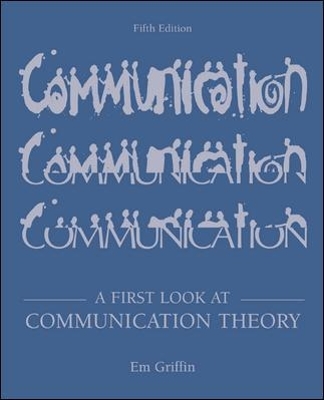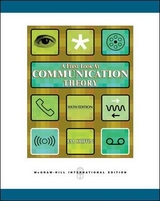
A First Look at Communication Theory with Conversations with Communication Theorists CD-ROM 2.0
McGraw-Hill Professional
978-0-07-282482-7 (ISBN)
- Titel ist leider vergriffen;
keine Neuauflage - Artikel merken
This best selling text analyzes the major communication theories at a level appropriate for both lower and upper level courses. The material is presented in a coherent manner and strikes a balance between humanistic, scientific, classical, and contemporary theories. (In contrast to previous editions--no theories have been dropped.) Ethics are covered throughout the text. A First Look at Communication Theory is the most widely used textbook for the communication theory course.
Em Griffin received his B.A. in political science from the University of Michigan, and his M.A. and Ph.D. in Communication from Northwestern University. He is professor of communication at Wheaton College in Illinois, where he has taught for the past 26 years and has been chosen Teacher of the Year. His research interest centers on the development of close friendships. Dr. Griffin is the author of three applied communication books: The Mind Changers analyzes practical techniques of persuasion; Getting Together offers research-based suggestions for effective group leadership; and Making Friends describes the way that quality interpersonal communication can build close relationships. He also leads workshops on these topics in the Philippines, Singapore, and the United States.
Part One: Overview Introduction1. Talk about Theory 2. Mapping the Territory3. Weighing the Words (Bormann)Part Two: Interpersonal Communication Interpersonal Messages4. Symbolic Interactionism (Mead)5. Coordinated Management of Meaning (Pearce & Cronen)6. Expectancy Violations Theory (Burgoon)7. Interpersonal Deception Theory (Buller & Burgoon)Ethical ReflectionsKant’s Categorical ImperativeAugustine’s Divine WillBok’s Principle of VeracityCognitive Processing8. Constructivism (Delia)Relationship Development9. Social Penetration Theory (Altman & Taylor)10. Uncertainty Reduction Theory (Berger)Relationship Maintenance11. Relational Dialectics (Baxter & Montgomery)12. The Interactional View (Watzlawick)Influence13. Social Judgment Theory (Sherif)14. Elaboration Likelihood Model (Petty & Cacioppo)15. Cognitive Dissonance Theory (Festinger)Ethical ReflectionsBuber’s Dialogic EthicsNilsen’s Significant ChoicePart Three: Group and Public Communication Group Decision Making16. Functional Perspective on Group Decision Making (Hirokawa & Gouran)17. Adaptive Structuration Theory (Poole)Organizational Communication18. Information Systems Approach to Organizations (Weick)19. Cultural Approach to Organizations (Geertz & Pacanowsky)20. Critical Theory of Communication Approach to Organizations (Deetz)Public Rhetoric21. The Rhetoric (Aristotle)22. Dramatism (Burke)23. Narrative Paradigm (Fisher)Ethical ReflectionsAristotle’s Golden MeanWest’s Prophetic PragmatismPart Four: Mass Communication Media and Culture24. Technological Determinism (McLuhan)25. Semiotics (Barthes)26. Cultural Studies (Hall)Media Effects27. Cultivation Theory (Gerbner)28. Agenda-Setting Theory (McCombs & Shaw)29. The Media Equation (Reeves & Nass)Ethical ReflectionsHabermas’ Discourse EthicsChristians’ Communitarian EthicsPart Five: Cultural Context Intercultural Communication30. Anxiety/Uncertainty Management Theory (Gudykunst)31. Face-Negotiation Theory (Ting-Toomey)32. Speech Codes Theory (Philipsen)Gender and Communication33. Genderlect Styles (Tannen)34. Standpoint Theory (Harding & Wood)35. Muted Group Theory (Kramarae)Ethical ReflectionsGilligan’s Different VoiceBenhabib’s Interactive UniversalismPart Six: Integration Communication Theory36. Order Out of ChaosAppendicesA.Glossary B.Abstracts of Theories C.Academic Journals That Focus on Communication TheoryD.Feature Films That Illustrate Communication TheoryE.The National Communication Association Credo for Communication Ethics
| Erscheint lt. Verlag | 16.8.2002 |
|---|---|
| Sprache | englisch |
| Maße | 188 x 234 mm |
| Gewicht | 454 g |
| Themenwelt | Schulbuch / Wörterbuch |
| ISBN-10 | 0-07-282482-4 / 0072824824 |
| ISBN-13 | 978-0-07-282482-7 / 9780072824827 |
| Zustand | Neuware |
| Haben Sie eine Frage zum Produkt? |
aus dem Bereich



